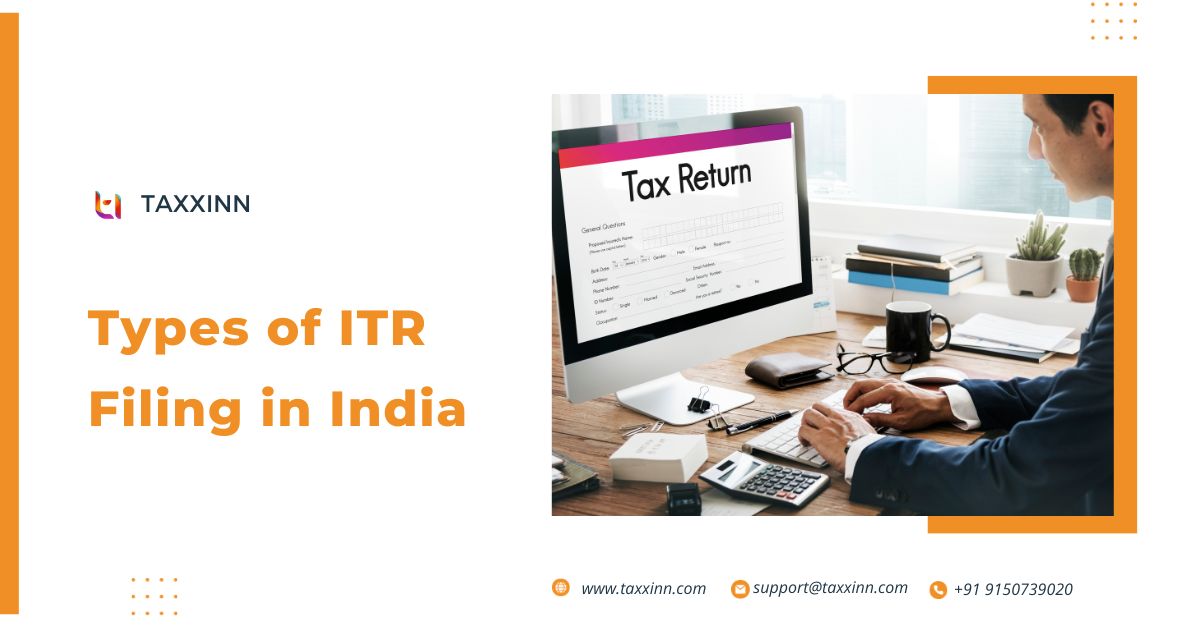The Income Tax Department offers various ITR forms tailored to different taxpayer groups and income sources. These forms meticulously document your income and tax payments to the government, and they find their roots in the Indian Income Tax Act of 1961. Neglecting to file your income tax return can lead to penalties and legal consequences.
Timely ITR filing is crucial, whether you’re eyeing international investments, tax refunds, loans, or immigration processes. Having the right ITR form can streamline these procedures. This article provides an accessible guide to understanding income tax return forms, categorised according to taxpayer types and income sources. Discover different ITR forms and why they matter for types of income tax return filing.
What is ITR Forms?
The Income Tax Department collects data on revenue, deductions, and tax payments using the appropriate ITR form during a financial year. This process allows both taxpayers and tax authorities to quickly assess tax obligations, schedule tax payments, and potentially receive an income tax refund if they’ve overpaid. Before filing their taxes, taxpayers must determine the correct ITR form to use, as there are various formats for different situations. Explore the details of these forms below to understand the types of income tax return filing. Along with the right ITR form necessary documents are required for proper ITR filing.
Types of ITR Forms
Form 16
An employee receives a Form 16 TDS certificate from their employer. Form 16 details the gross income and deductions such as HRA and LTA. It also contains information about the employee’s net taxable income, any reported additional income or losses, tax deductions, and salary TDS.
Form 26AS
Form 26AS, acting as a tax return, contains details about Tax Deducted at Source (TDS) deducted from various income sources such as salaries, loans, and real estate sales. The form also encompasses financial transactions, self-assessment tax data, and advance tax payments made by individuals.
Form 15G and Form 15H
You can use Forms 15G and 15H to earn income without incurring TDS (Tax Deducted at Source). If your gross taxable income is below the basic exemption threshold and you’re not over 60 years old, you can submit Form 15G. If you’re a senior citizen with no tax payable on your net income, you should submit Form 15H. These forms must be submitted to the entity responsible for deducting your taxes.
Types of Income Tax Return Filing
The following are the different types of income tax return filing in India and their applicability.
ITR 1
ITR 1 For individuals residing outside their usual place of residence and earning a total income of up to Rs. 50 lakhs, this applies. This includes income from employment, a single home, other sources, and agricultural income up to Rs. 5,000. It also applies to individuals holding director positions in companies or owning investments in unlisted equity shares.
ITR 1 Who Can File?
- An individual who receives financial assistance through a pension or salary.
- A person whose sole source of income is a specific property.
- Someone who does not earn any income from capital gains or other sources.
- An individual with no foreign investments and zero foreign income.
- An individual earning up to ₹5000 in the agricultural sector.
- Someone with income from multiple sources, including investments and fixed deposits.
- Anyone without income from sources like lottery winnings or racehorses.
- Individuals interested in pooling funds with their spouses or young children.
Who is Not Eligible?
- One earning an annual income exceeding 50 lakhs
- Those earning more than 5000 in the agricultural industry
- Individuals with revenue generated from their businesses and capital gains
- Applicants using ITR 1 are ineligible for the position of corporate director.
- Any person investing in unlisted equity shares throughout the financial year cannot use this application form.
- This form cannot be used to submit an ITR for an individual responsible for another person’s income.
ITR 2
Income from various sources, including multiple properties, capital gains, foreign investments, agricultural income, and salaries, must total at least Rs. 5,000 for both individuals and HUFs. The annual income may exceed Rs. 50 lakhs. The profits and earnings from a business or profession should not be attributed to the individual.
ITR 2 Who Can File?
- Individuals with an annual income exceeding Rs. 50 lakhs.
- If they earn income through employment, a pension, a property, or additional sources like horse racing or lotteries.
- In case they acquire ESOPs or unlisted equity shares.
- If they serve as a director in a company.
- If they earn income from capital gains or the sale of a commodity or property.
- Individuals who own properties abroad and generate income from foreign sources.
- An individual earning over Rs. 5000 annually through agriculture.
Who is Not Eligible?
- Any individual or HUF whose primary source of income is their own business or profession.
- Partners who are deriving income from partnerships through a partnership firm.
ITR 3
People engaged in professions or businesses that constitute their source of income should report their earnings on Form 3. If you receive income from a retirement fund, salary, or other sources, the ITR 3 form can also be beneficial.
ITR 3 Who Can File?
- There are two residential statuses: resident and non-resident.
- Individuals with unlisted equity shareholdings at any time during the accounting year.
- Income from unrelated sources.
- Income potential of a partner in a company.
- Income from a pension or salary.
- Income from home-related property.
- In this case, the total income may exceed Rs. 50 lakh.
- Individuals or HUFs who have income falling under the category of “profits or gains of business or profession” do not qualify to file Forms ITR-1, ITR-2, or ITR-4.
- In simple terms, those who are ineligible to file ITR-1, ITR-2, or ITR-4 should file ITR-3 instead.
Who is Not Eligible?
- Individuals whose businesses generate less than 2 crores in revenue can submit Income Tax Return 3 if their taxable income through the business consists of salary, bonus, commission, payment, or interest.
- Any other form of company income is not permitted in this case.
ITR 4
A person residing in India with an aggregate annual income of up to 50 lakhs and earning revenue from a business or profession as determined by section 44AD, 44ADA, or 44AE falls under this description. This criteria applies to individuals, HUFs, and entities other than LLPs (not applicable to individuals holding the office of director in a company or possessing unlisted equity shares).
ITR 4 Who Can File?
- Every partnership firm, except LLPs, that is a resident and earns income from a profession or business, must comply with this form.
- Both residents and HUFs have an obligation to complete this form.
- Individuals who have opted for a presumptive income scheme under Sections 44AD, 44AE, and 44ADA of the Income Tax Act.
- If an individual’s business generates annual revenue exceeding Rs. 2 crore, they must file ITR-3 along with an audit report, not ITR-4.
- ITR-4 should not have a total revenue exceeding Rs. 50 lakhs.
Who is Not Eligible?
- Individuals with foreign assets.
- Company executives.
- Individuals earning income abroad.
- Taxpayers with an annual income exceeding Rs. 50 lakhs.
- Applicants are ineligible for this ITR if they carry forward losses in any income category.
- Investors in unlisted equity shares.
- Both non-residents and residents who are not ordinarily resident.
- Individuals with multiple rental properties as their source of income.
- Individuals with access to a foreign account and signing authority.
ITR 5
People filing ITR-5 include individuals, HUFs, businesses, and various other categories. This form is suitable for firms, limited liability partnerships (LLPs), bodies of individuals (BOIs), and associations of persons to file income taxes (AOPs).
ITR 5 Who Should File?
- Limited Liability Partnerships.
- Cooperative organisations.
- Local government.
- Artificial judges and solicitors.
- Firms.
- Association of Persons Insolvent buyers estate of the deceased.
- Investing Funds.
- Trusts in the business.
Who is Not Eligible?
- Anyone undertaking an ITR 1 filing, including Hindu Undivided Families (HUFs).
- Every company.
- This form cannot be filed by those who are filing ITR 7s.
- Candidates who obtain income from capital gains.
ITR 6
For every company besides those seeking exemption under Section 11.
ITR 6 Applicable to Whom?
- All businesses, excluding those claiming exemption under Section 11.
- Real estate rental income Business profits
- Multiple sources of income.
Who is Not Eligible?
- Due to the fact that Section 11 organisations utilise this income for charitable or religious purposes, they are eligible for tax exemptions.
- Revenues generated from capital gains.
- HUFs or specific individuals.
ITR 7
People and organisations falling under Sections 139 (4A), 139 (4B), 139 (4C), and 139 (4D) of the Internal Revenue Code are required to utilise Form 7 for their income tax returns. E-filing, often recognised as a simple, fast, and paperless method for submitting ITR forms, allows you to effortlessly file your ITR form online.
ITR 7 Who Can File?
- Companies filing under the aforementioned sections are eligible to use ITR 7, as mentioned earlier.
- Section 139(4A): Taxpayers earning income from trust assets or other forms of total legal obligations for charitable or religious purposes must file their income tax returns using this form.
- If a political party’s total income exceeds the non-taxable threshold, Section 139(4B) requires them to file returns.
- Section 139(4C): The ITR 7 form is to be used to submit returns for the following organisations under this Section:
1. News companies.
2. Institutions subject to Section 10(23A).
3. Associations for scientific research.
4. Associations or institutions covered by Section 10(23B).
- Section 139(4D): Taxpayers earning income from trust assets or additional colleges, universities, and other institutions are required to file specific returns under Section 139(4D). Individuals are not required to file a return of income and losses under this Section, except as specified in other provisions of Section 139(4D).
- Section 139(4E): Business trusts submit returns without including income or loss statements.
- Section 139(4F): Funds that invest must submit returns under this section of the law after filing returns in compliance with Section 115UB. When filing IT returns in accordance with any provision of this section, income or loss returns are not required to be submitted.
Who is Not Eligible?
- Salaried individuals and HUFs must adhere to ITR 1.
- ITR 7 cannot be used by those eligible for the ITR 5 tax rate to file their IT returns.
Why Should We File ITR?
- If you plan to request an income tax refund from the department.
- If you have received income from international sources or invested in foreign assets during the financial year.
- When you intend to apply for a loan or visa.
- Whether the taxpayer records a profit or loss depends on its status as a company or firm.
- Failure to file your tax return before the due date will result in the inability to carry forward any losses from your business, profession, or capital gains to the next year.
Conclusion
Every individual and business must comply with the law by filing income tax returns for each financial year. It’s essential to report all sources of income, such as salary, capital gains, dividends, interest, and more, annually. If your return indicates you’ve overpaid, you may be eligible for a tax refund. For any inquiries, reach out to Taxxinn, where our filing executives will assist you in filing your ITR and help you choose the right ITR among the different types of income tax return filing.
Related Reads,
How to Check ITR Filing Status?
Belated Income Tax Return Filing.


